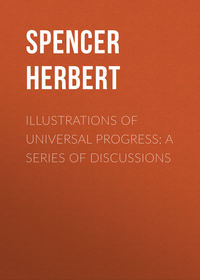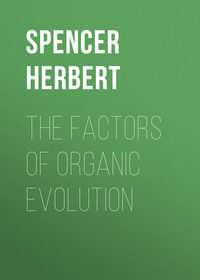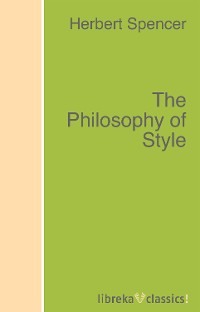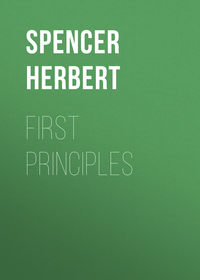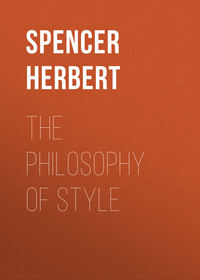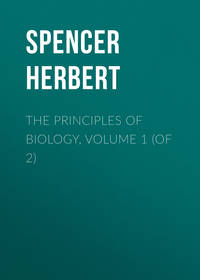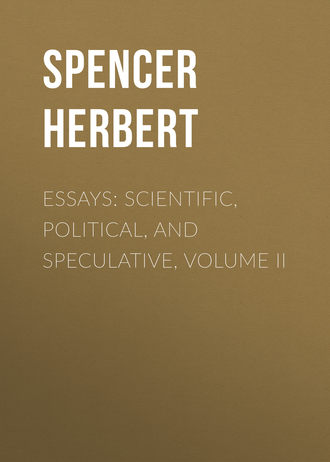 полная версия
полная версияEssays: Scientific, Political, and Speculative, Volume II
• SOCIOLOGY.. An account of aggregates.
That those who espouse opposite views see clearly the defects in the propositions of their opponents and not those in their own, is a trite remark that holds in philosophical discussions as in all others: the parable of the mote and the beam applies as well to men’s appreciations of one another’s opinions as to their appreciations of one another’s natures. Possibly to my positivist friends I exemplify this truth, – just as they exemplify it to me. Those uncommitted to either view must decide where the mote exists and where the beam. Meanwhile it is clear that one or other of the two views is essentially erroneous; and that no qualifications can bring them into harmony. Either the sciences admit of no such grouping as that which I have described, or they admit of no such serial order as that given by M. Comte.
POSTSCRIPT REPLYING TO CRITICISMSAmong objections made to any doctrine, those which come from avowed supporters of an adverse doctrine must be considered, other things equal, as of less weight than those which come from men uncommitted to an adverse doctrine, or but partially committed to it. The element of prepossession, distinctly present in the one case and in the other case mainly or quite absent, is a well-recognized cause of difference in the values of the judgments: supposing the judgments to be otherwise fairly comparable. Hence, when it is needful to bring the replies within a restricted space, a fit course is that of dealing rather with independent criticisms than with criticisms which are really indirect arguments for an opposite view, previously espoused.
For this reason I propose here to confine myself substantially, though not absolutely, to the demurrers entered against the foregoing classification by Prof. Bain, in his recent work on Logic. Before dealing with the more important of these, let me clear the ground by disposing of the less important.
Incidentally, while commenting on the view I take respecting the position of Logic, Prof. Bain points out that this, which is the most abstract of the sciences, owes much to Psychology, which I place among the Concrete Sciences; and he alleges an incongruity between this fact and my statement that the Concrete Sciences are not instrumental in disclosing the truths of the Abstract Sciences. Subsequently he re-raises this apparent anomaly when saying —
“Nor is it possible to justify the placing of Psychology wholly among Concrete Sciences. It is a highly analytic science, as Mr. Spencer thoroughly knows.”
For a full reply, given by implication, I must refer Prof. Bain to § 56 of The Principles of Psychology , where I have contended that “while, under its objective aspect, Psychology is to be classed as one of the Concrete Sciences which successively decrease in scope as they increase in speciality; under its subjective aspect, Psychology is a totally unique science, independent of, and antithetically opposed to, all other sciences whatever.” A pure idealist will not, I suppose, recognize this distinction; but to every one else it must, I should think, be obvious that the science of subjective existences is the correlative of all the sciences of objective existences; and is as absolutely marked off from them as subject is from object. Objective Psychology, which I class among the Concrete Sciences, is purely synthetic, so long as it is limited, like the other sciences, to objective data; though great aid in the interpretation of these data is derived from the observed correspondence between the phenomena of Objective Psychology as presented in other beings and the phenomena of Subjective Psychology as presented in one’s own consciousness. Now it is Subjective Psychology only which is analytic, and which affords aid in the development of Logic. This being explained, the apparent incongruity disappears.
A difficulty raised respecting the manner in which I have expressed the nature of Mathematics, may next be dealt with. Prof. Bain writes: —
“In the first place, objection may be taken to his language, in discussing the extreme Abstract Sciences, when he speaks of the empty forms therein considered. To call Space and Time empty forms, must mean that they can be thought of without any concrete embodiment whatsoever; that one can think of Time, as a pure abstraction, without having in one’s mind any concrete succession. Now, this doctrine is in the last degree questionable.”
I quite agree with Prof. Bain that “this doctrine is in the last degree questionable;” but I do not admit that this doctrine is implied by the definition of Abstract Science which I have given. I speak of Space and Time as they are dealt with by mathematicians, and as it is alone possible for pure Mathematics to deal with them. While Mathematics habitually uses in its points, lines, and surfaces, certain existences, it habitually deals with these as representing points, lines, and surfaces that are ideal; and its conclusions are true only on condition that it does this. Points having dimensions, lines having breadths, planes having thicknesses, are negatived by its definitions. Using, though it does, material representatives of extension, linear, superficial, or solid, Geometry deliberately ignores their materiality; and attends only to the truths of relation they present. Holding with Prof. Bain, as I do, that our consciousness of Space is disclosed by our experiences of Matter – arguing, as I have done in The Principles of Psychology , that it is a consolidated aggregate of all relations of co-existence that have been severally presented by Matter; I nevertheless contend that it is possible to dissociate these relations from Matter to the extent required for formulating them as abstract truths. I contend, too, that this separation is of the kind habitually made in other cases; as, for instance, when the general laws of motion are formulated (as M. Comte’s system, among others, formulates them) in such way as to ignore all properties of the bodies dealt with save their powers of taking up, and retaining, and giving out, quantities of motion; though these powers are inconceivable apart from the attribute of extension, which is intentionally disregarded.
Taking other of Prof. Bain’s objections, not in the order in which they stand but in the order in which they may be most conveniently dealt with, I quote as follows: —
“The law of the radiation of light (the inverse square of the distance) is said by Mr. Spencer to be Abstract-Concrete, while the disturbing changes in the medium are not to be mentioned except in a Concrete Science of Optics. We need not remark that such a separate handling is unknown to science.”
It is perfectly true that “such a separate handling is unknown to science.” But, unfortunately for the objection, it is also perfectly true that no such separate handling is proposed by me, or is implied by my classification. How Prof. Bain can have so missed the meaning of the word “concrete,” as I have used it, I do not understand. After pointing out that “no one ever drew the line,” between the Abstract-Concrete and the Concrete Sciences, “as I have done it,” he alleges an anomaly which exists only supposing that I have drawn it where it is ordinarily drawn. He appears inadvertently to have carried with him M. Comte’s conception of Optics as a Concrete Science, and, importing it into my classification, debits me with the incongruity. If he will re-read the definition of the Abstract-Concrete Sciences, or study their sub-divisions as shown in Table II., he will, I think, see that the most special laws of the redistribution of light, equally with its most general laws, are included. And if he will pass to the definition and the tabulation of the Concrete Sciences, he will, I think, see no less clearly that Optics cannot be included among them.
Prof. Bain considers that I am not justified in classing Chemistry as an Abstract-Concrete Science, and excluding from it all consideration of the crude forms of the various substances dealt with; and he enforces his dissent by saying that chemists habitually describe the ores and impure mixtures in which the elements, etc., are naturally found. Undoubtedly chemists do this. But do they therefore intend to include an account of the ores of a substance, as a part of the science which formulates its molecular constitution and the constitutions of all the definite compounds it enters into? I shall be very much surprised if I find that they do. Chemists habitually prefix to their works a division treating of Molecular Physics; but they do not therefore claim Molecular Physics as a part of Chemistry. If they similarly prefix to the chemistry of each substance an outline of its mineralogy, I do not think they therefore mean to assert that the last belongs to the first. Chemistry proper, embraces nothing beyond an account of the constitutions and modes of action and combining proportions of substances that are taken as absolutely pure; and its truths no more recognize impure substances than the truths of Geometry recognize crooked lines.
Immediately after, in criticizing the fundamental distinction I have made between Chemistry and Biology, as Abstract-Concrete and Concrete respectively, Prof. Bain says: —
“But the objects of Chemistry and the objects of Biology are equally concrete, so far as they go; the simple bodies of chemistry, and their several compounds, are viewed by the Chemist as concrete wholes, and are described by him, not with reference to one factor, but to all their factors.”
Issue is here raised in a form convenient for elucidation of the general question. It is true that, for purposes of identification , a chemist gives an account of all the sensible characters of a substance. He sets down its crystalline form, its specific gravity, its power of refracting light, its behaviour as magnetic or diamagnetic. But does he thereby include these phenomena as part of the Science of Chemistry? It seems to me that the relation between the weight of any portion of matter and its bulk, which is ascertained on measuring its specific gravity, is a physical and not a chemical fact. I think, too, that the physicist will claim, as part of his science, all investigations touching the refraction of light: be the substance producing this refraction what it may. And the circumstance that the chemist may test the magnetic or diamagnetic property of a body, as a means of ascertaining what it is, or as a means of helping other chemists to determine whether they have got before them the same body, will neither be held by the chemist, nor allowed by the physicist, to imply a transfer of magnetic phenomena from the domain of the one to that of the other. In brief, though the chemist, in his account of an element or a compound, may refer to certain physical traits associated with its molecular constitution and affinities, he does not by so doing change these into chemical traits. Whatever chemists may put into their books, Chemistry, considered as a science, includes only the phenomena of molecular structures and changes – of compositions and decompositions. 12 I contend, then, that Chemistry does not give an account of anything as a concrete whole, in the same way that Biology gives an account of an organism as a concrete whole. This will become even more manifest on observing the character of the biological account. All the attributes of an organism are comprehended, from the most general to the most special – from its conspicuous structural traits to its hidden and faint ones; from its outer actions that thrust themselves on the attention, to the minutest sub-divisions of its multitudinous internal functions; from its character as a germ, through the many changes of size, form, organization, and habit, it goes through until death; from the physical characters of it as a whole, to the physical characters of its microscopic cells, and vessels, and fibres; from the chemical characters of its substance in general to the chemical characters of each tissue and each secretion – all these, with many others. And not only so, but there is comprehended as the ideal goal of the science, the consensus of all these phenomena in their co-existences and successions, as constituting a coherent individualized group definitely combined in space and in time. It is this recognition of individuality in its subject-matter, that gives its concreteness to Biology, as to every other Concrete Science. As Astronomy deals with bodies that have their several proper names, or (as with the smaller stars) are registered by their positions, and considers each of them as a distinct individual – as Geology, while dimly perceiving in the Moon and nearest planets other groups of geological phenomena (which it would deal with as independent wholes, did not distance forbid), occupies itself with that individualized group presented by the Earth; so Biology treats either of an individual distinguished from all others, or of parts or products belonging to such an individual, or of structural or functional traits common to many such individuals that have been observed, and supposed to be common to others that are like them in most or all of their attributes. Every biological truth connotes a specifically individualized object, or a number of specifically individualized objects of the same kind, or numbers of different kinds that are severally specific. See, then, the contrast. The truths of the Abstract-Concrete Sciences do not imply specific individuality. Neither Molar Physics, nor Molecular Physics, nor Chemistry, concerns itself with this. The laws of motion are expressed without any reference whatever to the sizes or shapes of the moving masses; which may be taken indifferently to be suns or atoms. The relations between contraction and the escape of molecular motion, and between expansion and the absorption of molecular motion, are expressed in their general forms without reference to the kind of matter; and, if the degree of either that occurs in a particular kind of matter is formulated, no note is taken of the quantity of that matter, much less of its individuality. Similarly with Chemistry. When it inquires into the atomic weight, the molecular structure, the atomicity, the combining proportions, etc., of a substance, it is indifferent whether a grain or a ton be thought of – the conception of amount is absolutely irrelevant. And so with more special attributes. Sulphur, considered chemically, is not sulphur under its crystalline form, or under its allotropic viscid form, or as a liquid, or as a gas; but it is sulphur considered apart from those attributes of quantity, and shape, and state, that give individuality.
Prof. Bain objects to the division I have drawn between the Concrete Science of Astronomy and that Abstract-Concrete Science which deals with the mutually-modified motions of hypothetical masses in space, as “not a little arbitrary.” He says: —
“We can suppose a science to confine itself solely to the ‘factors,’ or the separated elements, and never, on any occasion, to combine two into a composite third. This position is intelligible, and possibly defensible. For example, in Astronomy, the Law of Persistence of Motion in a straight line might be discussed in pure ideal separation; and so, the Law of Gravity might be discussed in equally pure separation – both under the Abstract-Concrete department of Mechanics. It might then be reserved to a concrete department to unite these in the explanation of a projectile or of a planet. Such, however, is not Mr. Spencer’s boundary line. He allows Theoretical Mechanics to make this particular combination, and to arrive at the laws of planetary movement, in the case of a single planet. What he does not allow is, to proceed to the case of two planets, mutually disturbing one another, or a planet and a satellite, commonly called the ‘problem of the Three Bodies.’”
If I held what Prof. Bain supposes me to hold, my position would be an absurd one; but he misapprehends me. The misapprehension results in part from his having here, as before, used the word “concrete” with the Comtean meaning, as though it were my meaning; and in part from the inadequacy of my explanation. I did not in the least mean to imply that the Abstract-Concrete Science of Mechanics, when dealing with the motions of bodies in space, is limited to the interpretation of planetary movement such as it would be did only a single planet exist. It never occurred to me that my words might be so construed. Abstract-Concrete problems admit, in fact, of being complicated indefinitely, without going in the least beyond the definition. I do not draw the line, as Prof. Bain alleges, between the combination of two factors and the combination of three, or between the combination of any number and any greater number. I draw the line between the science which deals with the theory of the factors, taken singly and in combinations of two, three, four, or more, and the science which, giving to these factors the values derived from observations of actual objects, uses the theory to explain actual phenomena.
It is true that, in these departments of science, no radical distinction is consistently recognized between theory and the applications of theory. As Prof. Bain says: —
“Newton, in the First Book of the Principia, took up the problem of the Three Bodies, as applied to the Moon, and worked it to exhaustion. So writers on Theoretical Mechanics continue to include the Three Bodies, Precession, and the Tides.”
But, supreme though the authority of Newton may be as a mathematician and astronomer, and weighty as are the names of Laplace and Herschel, who in their works have similarly mingled theorems and the explanations yielded by them, it does not seem to me that these facts go for much; unless it can be shown that these writers intended thus to enunciate the views at which they had arrived respecting the classification of the sciences. Such a union as that presented in their works, adopted merely for the sake of convenience, is, in fact, the indication of incomplete development; and has been paralleled in simpler sciences which have afterwards outgrown it. Two conclusive illustrations are at hand. The name Geometry, utterly inapplicable by its meaning to the science as it now exists, was applicable in that first stage during which its few truths were taught in preparation for land-measuring and the setting-out of buildings; but, at a comparatively early date, these comparatively simple truths became separated from their applications, and were embodied by the Greek geometers into systems of theory. 13 A like purification is now taking place in another division of the science. In the Géométrie Descriptive of Monge, theorems were mixed with their applications to projection and plan-drawing. But, since his time, the science and the art have been segregating; and Descriptive Geometry, or, as it may be better termed, the Geometry of Position, is now recognized by mathematicians as a far-reaching system of truths, parts of which are already embodied in books that make no reference to derived methods available by the architect or the engineer. To meet a counter-illustration that will be cited, I may remark that though, in works on Algebra intended for beginners, the theories of quantitative relations, as treated algebraically, are accompanied by groups of problems to be solved, the subject-matters of these problems are not thereby made parts of the Science of Algebra. To say that they are, is to say that Algebra includes the conceptions of distances and relative speeds and times, or of weights and bulks and specific gravities, or of areas ploughed and days and wages; since these, and endless others, may be the terms of its equations. And just in the same way that these concrete problems, solved by its aid, cannot be incorporated with the Abstract Science of Algebra; so I contend that the concrete problems of Astronomy, cannot be incorporated with that division of Abstract-Concrete Science which develops the theory of the inter-actions of free bodies that attract one another.
On this point I find myself at issue, not only with Prof. Bain, but also with Mr. Mill, who contends that: —
“There is an abstract science of astronomy, namely, the theory of gravitation, which would equally agree with and explain the facts of a totally different solar system from the one of which our earth forms a part. The actual facts of our own system, the dimensions, distances, velocities, temperatures, physical constitution, etc., of the sun, earth, and planets, are properly the subject of a concrete science, similar to natural history; but the concrete is more inseparably united to the abstract science than in any other case, since the few celestial facts really accessible to us are nearly all required for discovering and proving the law of gravitation as an universal property of bodies, and have therefore an indispensable place in the abstract science as its fundamental data.” – Auguste Comte and Positivism , p. 43.
In this explanation, Mr. Mill recognizes the fundamental distinction between the Concrete Science of Astronomy, dealing with the bodies actually distributed in space, and a science dealing with hypothetical bodies hypothetically distributed in space. Nevertheless, he regards these sciences as not separable; because the second derives from the first the data whence the law of inter-action is derived. But the truth of this premiss, and the legitimacy of this inference, may alike be questioned. The discovery of the law of inter-action was not due primarily, but only secondarily, to observation of the heavenly bodies. The conception of an inter-acting force that varies inversely as the square of the distance, is an à priori conception rationally deducible from mechanical and geometrical considerations. Though unlike in derivation to the many empirical hypotheses of Kepler respecting planetary orbits and planetary motions, yet it was like the successful among these in its relation to astronomical phenomena: it was one of many possible hypotheses, which admitted of having their consequences worked out and tested; and one which, on having its implications compared with the results of observation, was found to explain them. In short, the theory of gravitation grew out of experiences of terrestrial phenomena; but the verification of it was reached through experiences of celestial phenomena. Passing now from premiss to inference, I do not see that, even were the alleged parentage substantiated, it would necessitate the supposed inseparability; any more than the descent of Geometry from land-measuring necessitates a persistent union of the two. In the case of Algebra, as above indicated, the disclosed laws of quantitative relations hold throughout multitudinous orders of phenomena that are extremely heterogeneous; and this makes conspicuous the distinction between the theory and its applications. Here the laws of quantitative relations among masses, distances, velocities, and momenta, being applied mainly (though not exclusively) to the concrete cases presented by Astronomy, the distinction between the theory and its applications is less conspicuous. But, intrinsically, it is as great in the one case as in the other.
How great it is, we shall see on taking an analogy. This is a living man, of whom we may know little more than that he is a visible, tangible person; or of whom we may know enough to form a voluminous biography. Again, this book tells of a fictitious hero, who, like the heroes of old romance, may be an impersonated virtue or vice, or, like a modern hero, one of mixed nature, whose various motives and consequent actions are elaborated into a semblance of reality. But no accuracy and completeness of the picture makes this fictitious personage an actual personage, or brings him any nearer to one. Nor does any meagreness in our knowledge of a real man reduce him any nearer to the imaginary being of a novel. To the last, the division between fiction and biography remains an impassable gulf. So, too, remains the division between the Science dealing with the inter-actions of hypothetical bodies in space, and the Science dealing with the inter-actions of existing bodies in space. We may elaborate the first to any degree whatever by the introduction of three, four, or any greater number of factors under any number of assumed conditions, until we symbolize a solar system; but to the last an account of our symbolic solar system is as far from an account of the actual solar system as fiction is from biography.


